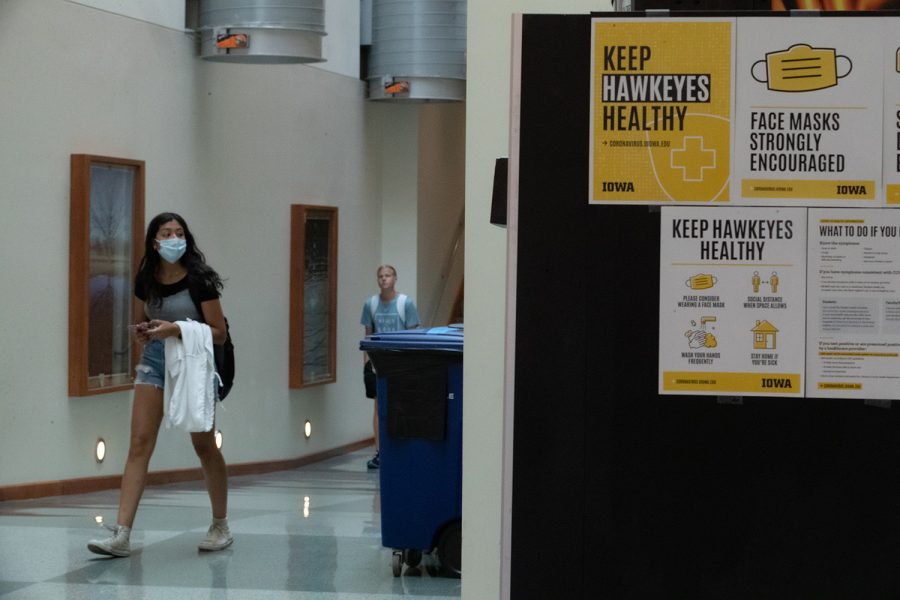Guest Opinion | UI COVID-19 policies aren’t equitable
COVID-19 guidelines set by the state Board of Regents don’t uphold DEI initiatives at the University of Iowa.
Two students walking in the Seaman Center on Aug. 23, 2021. Per the state Board of Regents COVID-19 mask policy, students have the option to wear a mask.
September 21, 2021
I’m a faculty member at the University of Iowa. Although I did my undergraduate studies elsewhere, I regularly envision my younger self as a current student. Would I find this reading interesting? What would I say about this topic? This year, I’m having trouble imagining my younger self as a student at the UI.
As an undergraduate student in the early 2000s, I did not have health insurance. When my mother’s family immigrated from China, they unknowingly had Hepatitis B: a disease that rapidly spread throughout much of Asia prior to the invention of an effective vaccine. I contracted Hepatitis B at birth. To deal with chronic complications, I was enrolled as a part-time undergraduate student, worked multiple jobs to afford medical care, and guarded my health against any other viruses or infections.
If my younger self was currently enrolled at the UI, I would run a greater risk of becoming infected with COVID-19 compared to universities with more robust prevention efforts. As part of the state Board of Regents policy, the university has no mandatory mitigation efforts against COVID-19: no masks, no vaccines, and no social distancing. In addition, faculty are mandated to teach in-person classes as part of a return to typical, pre-pandemic operation.
The pandemic has continued, however, and the policies have led to full classrooms with sizable numbers of unmasked individuals. Without more robust mitigation measures or more flexible delivery options for faculty (i.e., ability to shift classes from in-person to remote), this situation is even more dangerous for racial and ethnic minorities who are at higher risk of contracting COVID-19 and dying from complications compared to their white counterparts. This fact is not lost on graduate students who recently staged a “die-in” protest on campus.
By uncritically adopting the regents’ policies, the university has made the campus potentially less safe for individuals from diverse backgrounds; those with pre-existing medical conditions; and those with small financial means (e.g., no health insurance or savings). This directly undercuts the diversity, equity, and inclusion efforts of the UI.
The university has released a weekly dashboard of statistics related to COVID-19 infections on campus. To be fair, it does show small increases in infections since the beginning of the semester. However, the data only reflects self-reported numbers, and it’s logical to assume that infections will grow in an environment of lax mitigation.
To guard against infection, I typically wear two face masks when teaching my mandatory in-person classes. I’ve had to catch my breath a few times because it can be difficult to breathe through multiple layers of paper and cloth. However, it’s also because — when I look across my classroom — I can no longer see my younger self here.
-Shawn Datchuk, UI associate professor of special education



